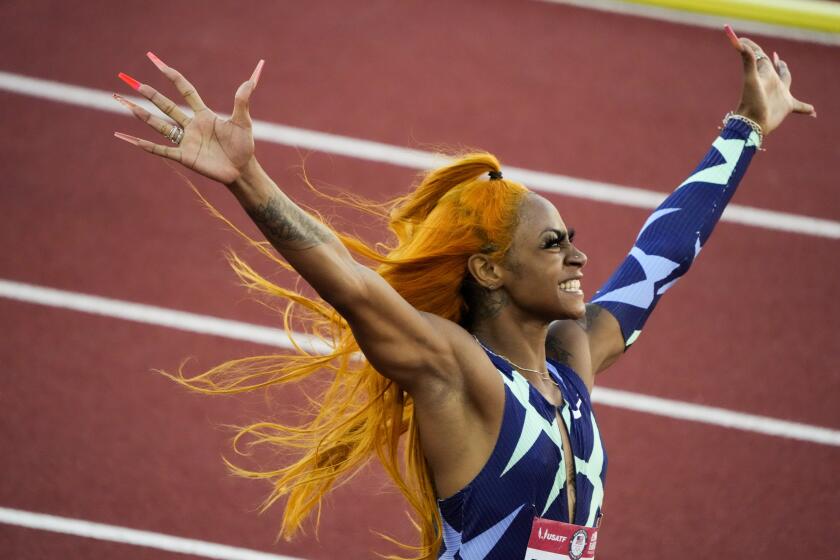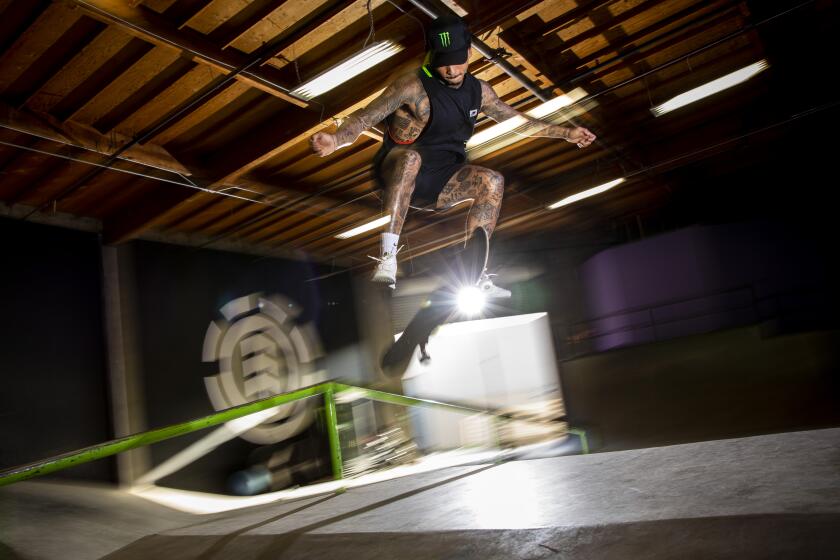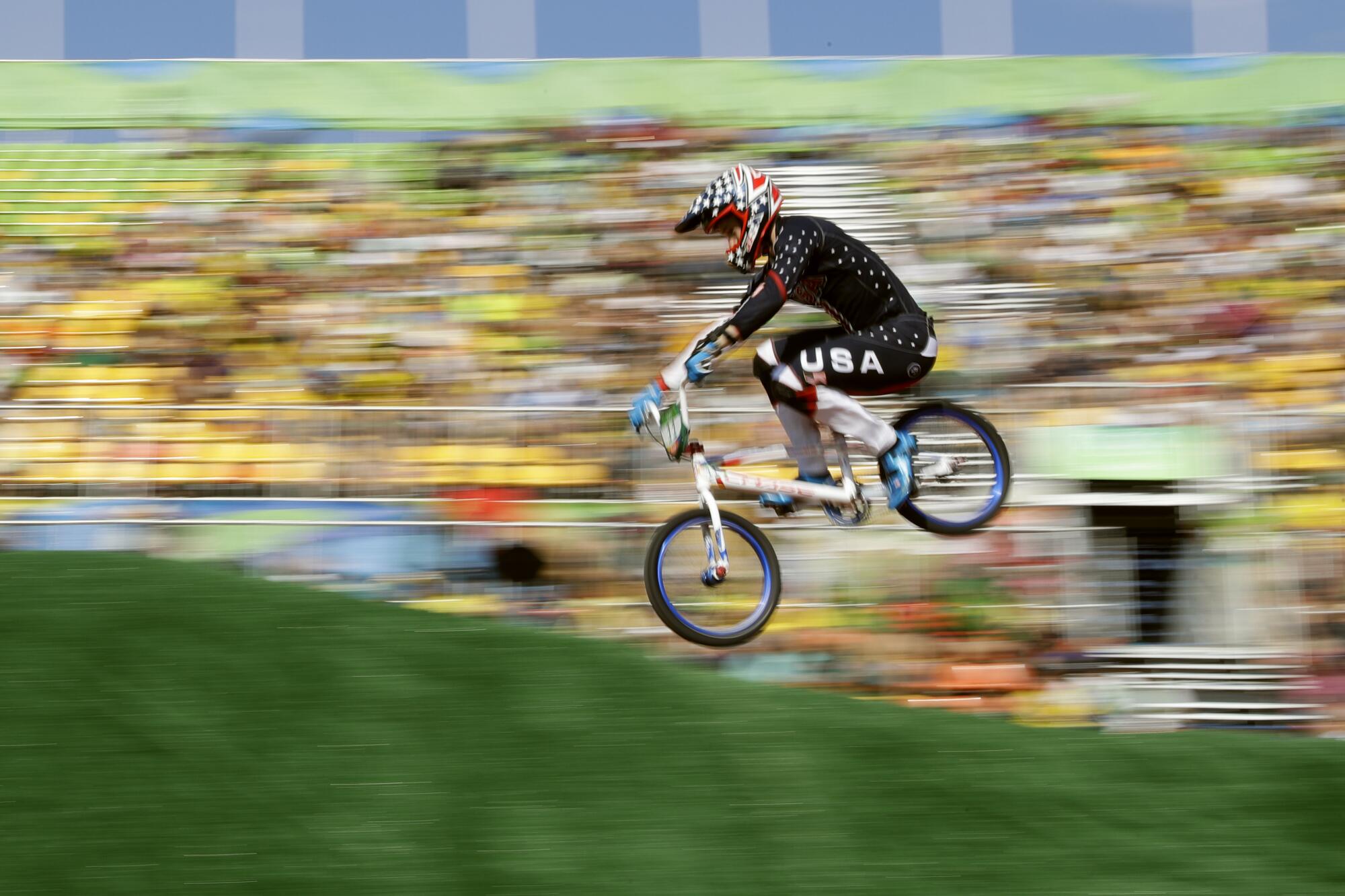
BMX racer Connor Fields hurtles through a seeding run before the 2016 Summer Olympics. Like other athletes, he has had limited opportunity to compete during the pandemic.
- Share via
In the year leading up to the Tokyo Olympics, Connor Fields was having trouble with nerves. His problem? It seems he wanted to feel more nervous.
The gold-medal BMX racer, forced to wait around for his third consecutive Summer Games because of the COVID-19 pandemic, got together with fellow riders to discuss raising the stakes on their daily routine.
They wanted something more than just practice, peddling furiously around a course day after day, leaning through banked turns and flying off jumps.
“We were on simulation [races] to stay sharp and get the butterflies,” Fields says. “You know, even bet lunch on it.”
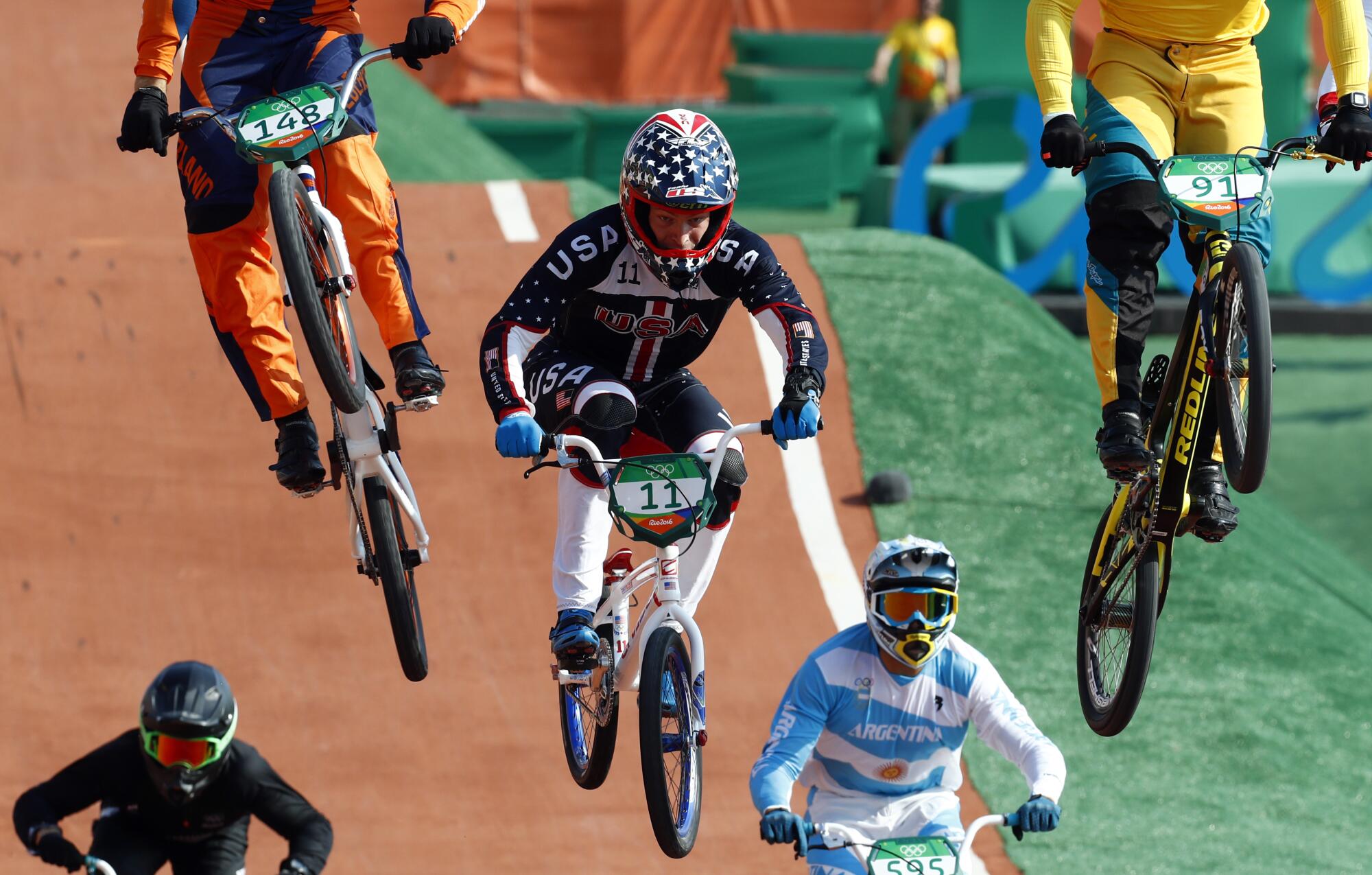
Connor Fields, center, competes during a BMX semifinal at the 2016 Games in Brazil.
Training for the Games — a marquee competition that normally comes around only once every four years — can be daunting. There is pressure to stay healthy and hit peak form at just the right time. This year, the global pandemic has added another challenge.
The coronavirus shutdown wiped out a year’s worth of races, games and matches in every sport, robbing athletes of chances to hone their competitive edge. For many, what should have been a gradual, season-long buildup has been reduced to a few events and the Olympic trials at the last moment.
“Any disruption to the plan at this time is scary,” says Sean McCann, a senior sport psychologist for the U.S. Olympic & Paralympic Committee. “That has created a lot of stress.”
Some athletes have gone to unusual lengths — more than just wagering on lunch — to re-create a game-day atmosphere. Others have spent months working through their concerns in therapy.
“It’s nerve-racking,” says Yul Moldauer, who qualified for the U.S. men’s gymnastics team last weekend. “We haven’t gotten all the opportunities we usually have.”
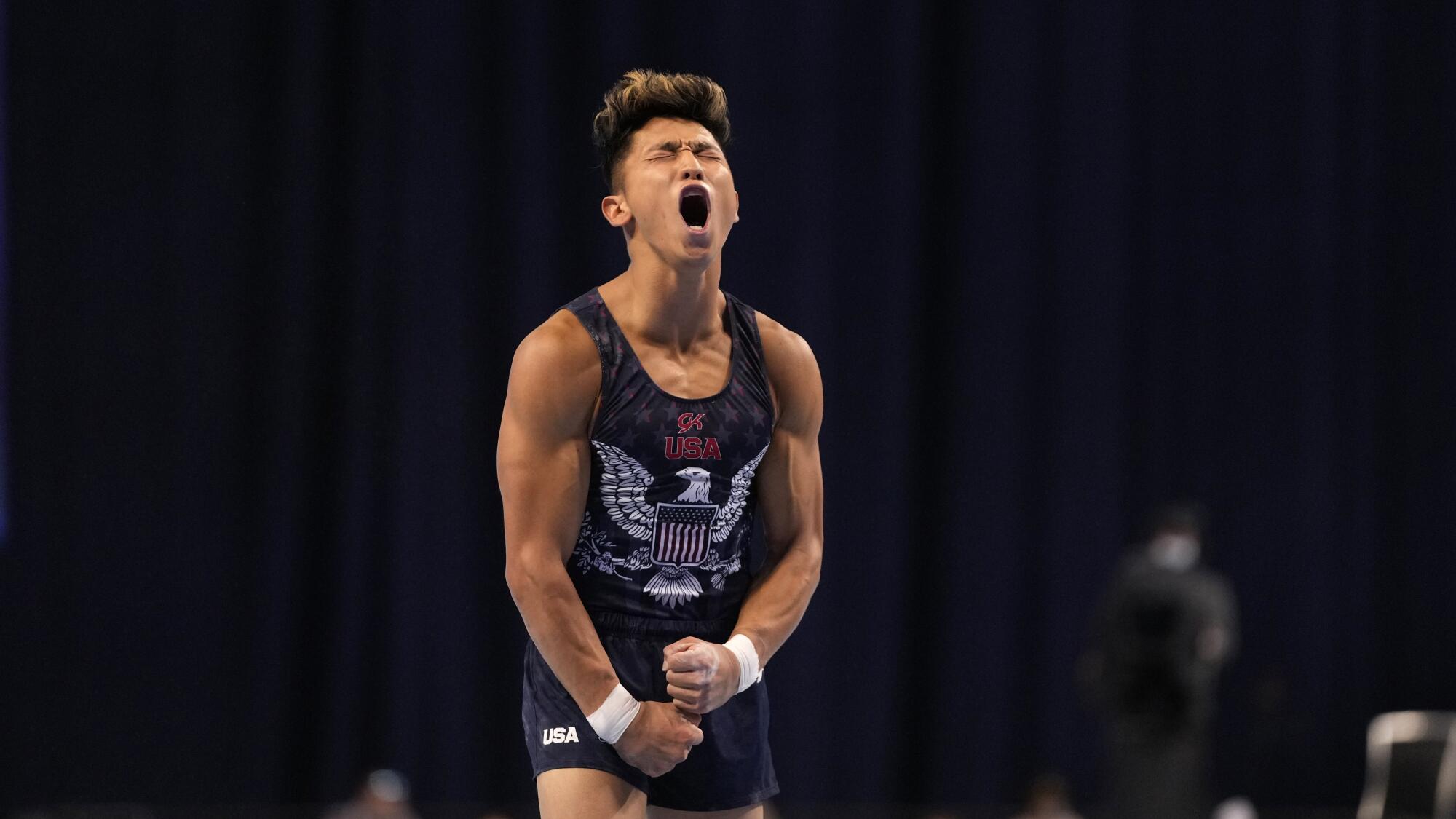
Most Olympic hopefuls learn from a young age to deal with the jitters of putting everything on the line. They can handle winning and losing, but uncertainty is another matter.
Elite athletes tend to be careful planners, working with their coaches to schedule practice routines and competitions well in advance. Track athletes, for example, like to have half a dozen or more events leading up to the U.S. trials in June, then two more in the month before the Games begin.
“You want to build momentum,” says Christian Taylor, a two-time Olympic triple jump champion whose bid for a third gold ended with a torn Achilles tendon in May. “But this is uncharted territory.”
After Sha’Carri Richardson was effectively banned from running the 100 meters at the Olympics, people are angrily asking why authorities still consider marijuana a prohibited substance.
With few synchronized diving events on the calendar, Kassidy Cook and Sarah Bacon improvised by placing a camera poolside and inviting a panel of judges to join them on Zoom. The pair, who won a national championship on the 3-meter springboard in 2019, treated the virtual meet like any other competition, right down to their ritual fist bump before each attempt.
“You have to convince yourself it’s real,” Cook says. “That gets the adrenaline and nerves going.”
Gymnasts have put something extra into their morning workouts, cartwheeling and flipping across the mat as if it were the world championships. Sprinters have imagined opponents on their heels as they raced down the track alone. With training facilities closed during the shutdown, swimmers tethered themselves to the side of small pools and stroked as hard as if they were gunning for a national title.
“It’s nerve-racking. We haven’t gotten all the opportunities we usually have.”
— Yul Moldauer, who qualified for the U.S. men’s gymnastics team
Summer Rappaport, a triathlete headed for Tokyo, competed only once in 2020 and was startled at how hard it felt.
“There’s just something special about being on the race course and learning to thrive under pressure and just rising,” she says. “I’ve tried to fill the gap with some race visualization that I’ve worked on with my sports psychologist.”
The process requires some homework, McCann says. He tells athletes to sit down and close their eyes, envisioning every moment of their event, whether it’s the last turn of a 400-meter race or the final attempt at the vault in gymnastics. It’s a technique ski racers have employed for years and it works for other sports.
Breathing exercises — often reserved for race day — have become crucial to remaining calm in the months before Tokyo. USOPC psychophysiologist Lindsay Shaw has her athletes watch video of their best performances from 2019 to remember how it looked and felt to win.
Coaches can also play an important role. McCann urges them to throw a few surprises into practice because almost every competition presents what he calls a “disruption,” something about the schedule or venue or weather that nudges an athlete out of his or her comfort zone.
“You need to find a way to disrupt the way you think in training, when everything’s easy,” the sports psychologist says. “It’s all about getting disrupted and then getting back to the path.”
Laguna Beach’s Nyjah Huston brings a fierce commitment to training to a rebellious sport, making the skateboarder a star to watch in the Tokyo Olympics
During the heart of the pandemic, American athletes had to combat feelings of envy as they watched foreign rivals continue training and competing in nations that did not shut down. When infection rates finally began to ease in many parts of the world, life moving back toward normal, another issue arose.
Competitions restarted — BMX rider Fields was lucky to resume racing in winter — but the limited schedule made athletes feel pressure to excel right away, pushing hard at events that should have been tune-ups.
Nick Itkin, a young Los Angeles fencer who climbed into the top 10 during 2019, wasn’t thrilled with the way things went at his only international event before the Games, a tournament in Qatar. He and others had to rely on practice with teammates back home to reinforce their confidence.
“It’s sort of like coming back from an ACL injury,” McCann says. “They’re wondering, ‘Am I still the athlete I was in 2019 when I was on top of my game and nobody could touch me?’”
As two-time defending Olympic champions, the U.S. women’s water polo team spent additional time watching their opponents from afar, studying replays of European tournaments the last few months.
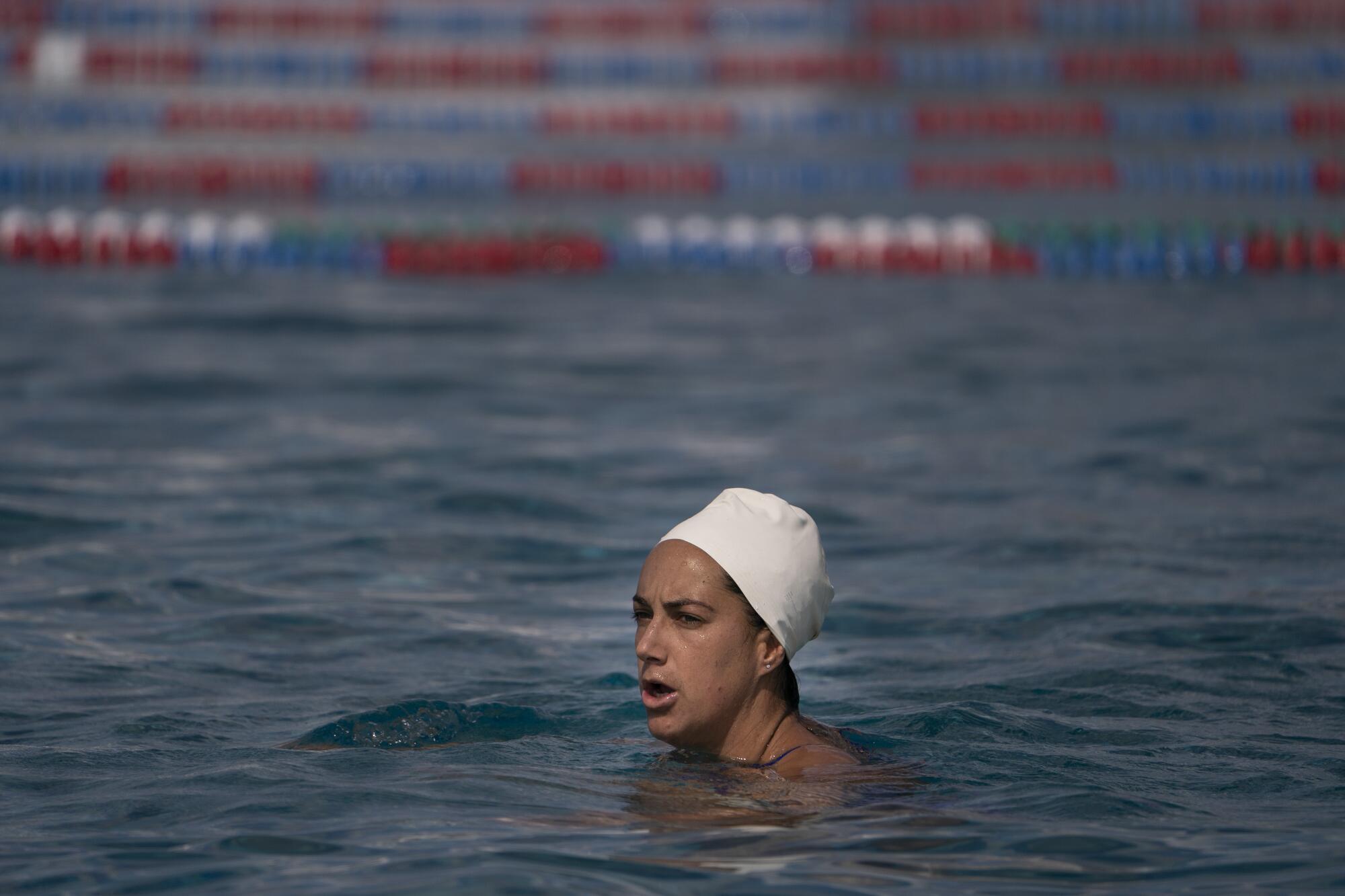
“Luckily, in this day and age, there’s a lot of video online,” veteran Maggie Steffens says. But, she adds, it’s “a little bit different than getting to play them physically and have the emotions involved and having somebody grabbing your suit.”
With the Summer Games only a few weeks away, McCann has been impressed by the way his athletes have adapted to the most extraordinary circumstances he has encountered in 30 years as a sports psychologist.
“It’s been a heavy lift,” he says. “But I’m seeing people come through this and not just survive, but shooting for excellence.”
Sprinter Jaide Stepter Baynes knew the situation was far from optimal as she tried for her first Olympic Games. There were long months when the best she could do was lift barbells on her balcony.
When competition resumed, she adjusted her expectations, taking a realistic approach to the U.S. track and field trials.
“Either way, you’re going to freak out,” she says. “So just embrace the freak-out.”
More to Read
Go beyond the scoreboard
Get the latest on L.A.'s teams in the daily Sports Report newsletter.
You may occasionally receive promotional content from the Los Angeles Times.

